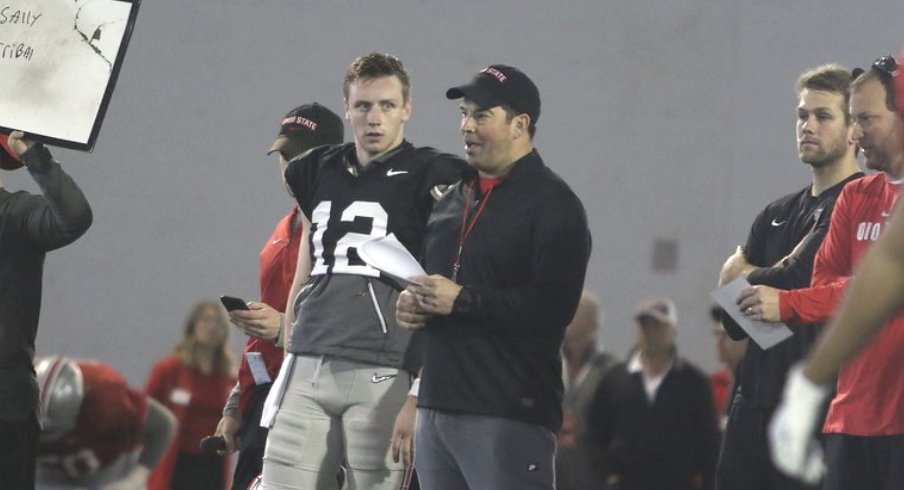As we relayed to you fine people yesterday afternoon, our good friend Matthew Baldwin was denied immediate eligibility to play for TCU in 2020, having transferred there from Ohio State this past April.
Those fans not living under rocks will note that the process with which Matthew Baldwin attempted to use to get playing time in 2020 is the same process that presumptive Buckeye starter Justin Fields and assumptive Miami starter Tate Martell used to go to their new digs and gain immediate playing time.
Congrats to them, because as Kevin pointed out yesterday, the NCAA updated its rules in June to ostensibly make it more difficult to obtain a waiver allowing a player to get in the field immediately. This comes basically six months after the opposite happened, and it was made substantially easier (in theory) to get said waiver.
And if you're sitting on your toilet or office chair or some amalgamation of both thinking "Well hell, that must've been a pretty big change!" you are wrong! Thanks to ESPN's Adam Rittenberg, we know it was in fact a very small change comprising of eight additional words:
Schools now must prove an athlete's transfer is "due to documented extenuating, extraordinary and mitigating circumstances outside of the student-athlete's control" in order to have a waiver approved, according to the updated guidelines obtained by ESPN. Previously, guidelines required just "documented, mitigating circumstances," a phrase that many think led to an increase in approvals of waiver requests.
I'm being glib; there's more to it than that, but the changes that you see here are indicative of the overall effect that the NCAA is going for, which is to give themselves just enough cover in legalese to avoid saying "Oh no, that's way too many transfers, no way" out loud and calling it a day.
Justin Fields and Tate Martell obviously benefited from the relatively lax interpretation of transfer rules. Though you could make the argument that Fields' waiver should've been accepted in any case given his personal circumstances (although maybe not, since his lawyer has flatly denied that racism had anything to do with his transfer and stated that they wouldn't discuss it any further), Martell pretty much just wanted to get out of Dodge and did so, citing Fields' transfer as his motivation for leaving.
Which is fine!
If Tate wants to roll down to Florida and kickstart the Miami Touchdown Machine, he should go for it. If I had an institutional path towards hanging out with Gloria Estefan, my body would be shaking and doing the conga until I couldn't control myself any longer right there with him.
So while Matthew Baldwin probably wouldn't have been a serious contender for playing time at TCU this season anyway, it still sucks that when compared to other Ohio State quarterbacks his defeat seems to be mostly a matter of timing rather than an honest appraisal of circumstance. Just ask guys like Luke Ford and Brock Hoffman, who have pretty damn compelling cases for being granted a waiver and were shot down.
What's frustrating is that the NCAA, as always, seems to be far more concerned with imagining some kind of Platonic ideal of a regulatory environment than creating a sane set of rules that could actually enforce it. If something goes haywire and student-athletes accidentally gain some measure of autonomy, it's easy as peas to make a revision or add some words, so before you can say "post hoc," you've gotten to the point you were seeking in the first place.
What would be easier, and more manageable, would be to have a guiding philosophy and stick with it. I would personally allow student-athletes a one time free transfer after their first year on campus (for a lot of reasons: it'd force coaches to be more honest during recruiting, it'd create more parity in sports like football, it'd give players more control over their careers, etc.), but even if the NCAA wouldn't go for that, they should at least have a sane and consistent concept of what it actually means to be a student-athlete before making rules about where and how they get to decide to play their sport.
That an interpretation of their own regulations caught them off guard to the point where the NCAA spent six months freaking out about it before yelling "DELETE! DELETE!!!" shows that they'd rather just tamp down on players whenever they get too big for their perceived britches.
Which is one approach. Another would be to actually talk with players, and maybe work with a representative organization of them to hammer out something that is more like a mutual understanding and less like someone skimming the rules on the back of the Monopoly box.
Or! Or.

Wheel of Morality, baby.
Look, if the NCAA isn't going to be consistent, the best alternative is to lean the hell into it and make it a game.
Every time a student-athlete wants to transfer, they must make the arduous trek to Collegiate Castle on Mount Doom in uhhhh downtown Indianapolis, whereupon they will spin a custom made wheel that will determine their fate, no matter what the circumstances are that led them there.
Immediate eligibility because something smells weird in the locker room? Why not!? Two season ban even though a crooked strength coach forced you to undergo a 17th century bloodletting procedure? Them's the breaks, kid!
Because what's the difference? If you're Matthew Baldwin or any other player who didn't sneak into the transfer portal during a very specific timeframe, you're leaving everything up to chance anyway. Might as well make it fun.


